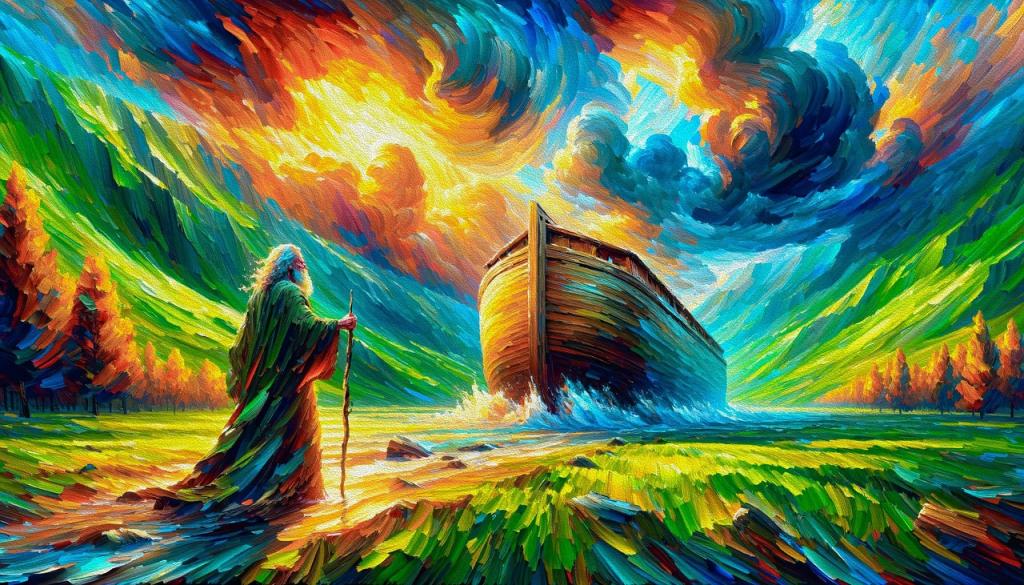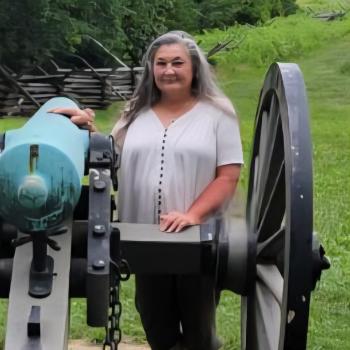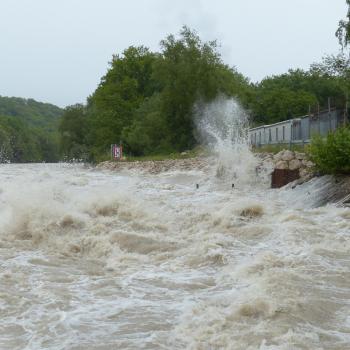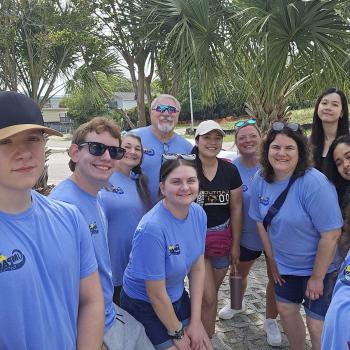
Noah, the Flood, and PTSD
Yesterday, I watched the incredible production of Noah from Sight and Sound. What an amazing experience! It included very good actors, music and dancing, beautiful and detailed sets, and many, many live animals. What a production! Somehow, watching the action with an enhanced but believable backstory made me think more about the man, Noah– “a righteous man, blameless among the people of his time, [who] walked faithfully with God.” How did someone with a resume like that end up a drunkard who cursed his own children? Maybe that question and the answer is more contemporary than we think.
The Genesis Account
Let’s look at the story from Genesis:
“The Lord saw how great the wickedness of the human race had become on the earth, and that every inclination of the thoughts of the human heart was only evil all the time. The Lord regretted that he had made human beings on the earth, and his heart was deeply troubled. So the Lord said, ‘I will wipe from the face of the earth the human race I have created—and with them the animals, the birds and the creatures that move along the ground—for I regret that I have made them.’ But Noah found favor in the eyes of the Lord.
“This is the account of Noah and his family: Noah was a righteous man, blameless among the people of his time, and he walked faithfully with God. Noah had three sons: Shem, Ham and Japheth.
“Now the earth was corrupt in God’s sight and was full of violence. God saw how corrupt the earth had become, for all the people on earth had corrupted their ways. So God said to Noah, ‘I am going to put an end to all people, for the earth is filled with violence because of them. I am surely going to destroy both them and the earth. So make yourself an ark of cypress wood; make rooms in it and coat it with pitch inside and out. This is how you are to build it.’” And God gave Noah a very detailed plan.
God went on to tell Noah,”I am going to bring floodwaters on the earth to destroy all life under the heavens, every creature that has the breath of life in it. Everything on earth will perish. But I will establish my covenant with you, and you will enter the ark—you and your sons and your wife and your sons’ wives with you. You are to bring into the ark two of all living creatures, male and female, to keep them alive with you. Two of every kind of bird, of every kind of animal and of every kind of creature that moves along the ground will come to you to be kept alive. You are to take every kind of food that is to be eaten and store it away as food for you and for them.”
“Noah did everything just as God commanded him.” What faith! Noah built a boat far away from any large body of water with the warning of a flood–a thing that had never happened before, according to some. “The first time the Bible records falling rain is in Genesis 7:4. Genesis 7:1-4 describes the instructions God gave to Noah. God told Noah that rain was going to destroy every living thing on the earth. It would be a worldwide flood” (Never Thirsty). And the people who lived around him were not sympathetic, nor did they believe him.
Continuing the Genesis account: “The Lord then said to Noah, ‘Go into the ark, you and your whole family, because I have found you righteous in this generation. Take with you seven pairs of every kind of clean animal, a male and its mate, and one pair of every kind of unclean animal, a male and its mate, and also seven pairs of every kind of bird, male and female, to keep their various kinds alive throughout the earth. Seven days from now I will send rain on the earth for forty days and forty nights, and I will wipe from the face of the earth every living creature I have made.’ And Noah did all that the Lord commanded him …
“On that very day Noah and his sons, Shem, Ham and Japheth, together with his wife and the wives of his three sons, entered the ark. Then the Lord shut him in.
“For forty days the flood kept coming on the earth, and as the waters increased, they lifted the ark high above the earth. The waters rose and increased greatly on the earth, and the ark floated on the surface of the water. They rose greatly on the earth, and all the high mountains under the entire heavens were covered. The waters rose and covered the mountains to a depth of more than fifteen cubits. Every living thing that moved on land perished—birds, livestock, wild animals, all the creatures that swarm over the earth, and all mankind. Everything on dry land that had the breath of life in its nostrils died. Every living thing on the face of the earth was wiped out; people and animals and the creatures that move along the ground and the birds were wiped from the earth. Only Noah was left, and those with him in the ark.”
After another two hundred plus days, Noah and his family stepped out of the ark onto a completely clean earth–no more evil, no more wickedness, no more people or living creatures of any kind. Gone were relatives, friends, neighbors, acquaintances; everyone he knew and everyone he didn’t; all mankind had become eight people.
At first, there was a lot to think about, like giving thanks, wondering at a rainbow, and getting his land legs back. But eventually, Noah had to remember the others. I wonder if he lay awake at night with the sounds of the cries of the dying in his ears. I wonder …
What Happened to Noah?
What happened next? “Noah, a man of the soil, proceeded to plant a vineyard. When he drank some of its wine, he became drunk and lay uncovered inside his tent. Ham, the father of Canaan, saw his father naked and told his two brothers outside. But Shem and Japheth took a garment and laid it across their shoulders; then they walked in backward and covered their father’s naked body. Their faces were turned the other way so that they would not see their father naked.
“When Noah awoke from his wine and found out what his youngest son had done to him, he said, ‘Cursed be Canaan! The lowest of slaves will he be to his brothers.’ He also said, ‘Praise be to the Lord, the God of Shem! May Canaan be the slave of Shem. May God extend Japheth’s territory; may Japheth live in the tents of Shem, and may Canaan be the slave of Japheth.’”
This is not the same Noah as we met in the beginning of the tale. It’s easy to criticize him. However, consider what he had been through–more than 9/11; more than any natural disaster; more than the Holocaust. Other than his immediate family (for whom I’m sure he was grateful), Noah lost everyone. I think we could make a case for a type of Post Traumatic Stress Disorder known as survivor’s guilt.
Survivor’s Guilt
In our world, survivor’s guilt is a psychological distress experience where an individual feels guilt, remorse, or a sense of undeserved privilege after surviving a traumatic event. Anger, irritability, changes in mood, detachment, feelings of isolation, and even thoughts of suicide, particularly when others have perished or suffered significantly, manifest in the individual. It’s a feeling that can arise after experiencing a tragedy, conflict, or even a medical situation such as Covid 19, where others did not survive. Survivor’s guilt can manifest in different ways, including feelings of not deserving to live, wishing for the opposite outcome, or experiencing difficulty moving past the event. It is not about external blame, but rather about internal feelings of guilt, unworthiness, or responsibility for not being the one who died or suffered. Nightmares, flashbacks, and other behaviors of PTSD, including substance abuse, can result. Obviously, Noah did not live in an age of Mental Health Professionals. He probably didn’t even have a mindset of excuses. He most likely just had feelings to which he was instinctively reacting, and his escape was to drink.
According to Healthline, “People living with survivor’s guilt experience guilty or remorseful feelings about the traumatic event. When these feelings show up in a cycle or repeating loop, you might struggle to turn your thoughts to anything else.” I’m quite sure, since one of his first responses upon stepping out on dry land was to build an altar to give thanks and worship, that Noah did not entirely lose faith. Healthline indicates that [Noah’s] “guilt could relate simply to [his] own survival, but [he] might also spend a lot of time thinking about what [he] might have done differently or how [he] could have helped others — even when [he] couldn’t have taken any specific action to change the outcome.”
The new edition of the Diagnostic and Statistical Manual of Mental Disorders (DSM) lists guilt and self-blame as symptoms of PTSD. Many people with survivor’s guilt also have PTSD, though you can experience one without the other.
The End of Noah’s Story
We don’t know for sure what Noah’s worldly end looked like, but Hebrews 11:7 continues his positive reputation: “By faith Noah, being warned by God concerning events as yet unseen, in reverent fear constructed an ark for the saving of his household. By this he condemned the world and became an heir of the righteousness that comes by faith.” He is listed with Enoch, Isaac, Jacob, and Abraham as verse 13 continues: “All these people were still living by faith when they died.”
Yes, even our Bible “heroes” have their challenges and flaws–they were human–but God is faithful, even when we are not. I, personally, am feeling a little more sympathetic toward Noah right now.
God bless you, and may He guard your heart and your mind in Christ Jesus.













